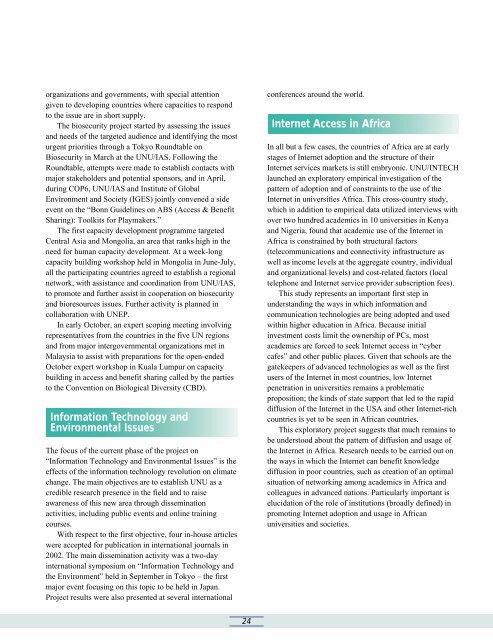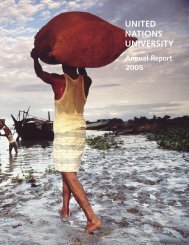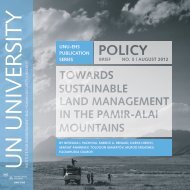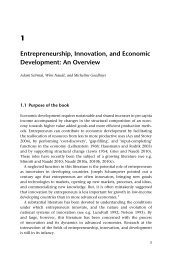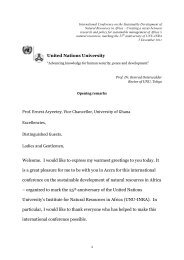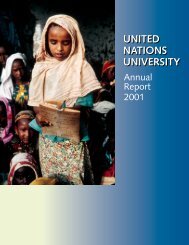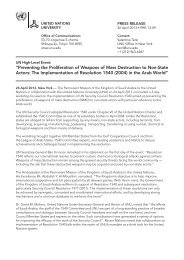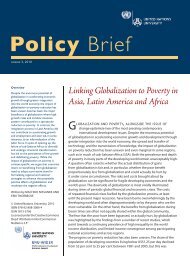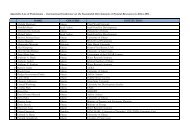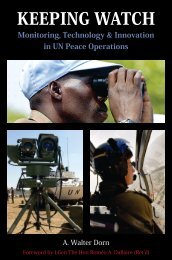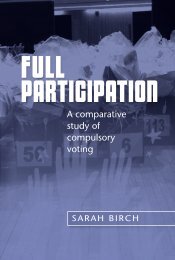Environment and Sustainable Development - United Nations ...
Environment and Sustainable Development - United Nations ...
Environment and Sustainable Development - United Nations ...
You also want an ePaper? Increase the reach of your titles
YUMPU automatically turns print PDFs into web optimized ePapers that Google loves.
organizations <strong>and</strong> governments, with special attention<br />
given to developing countries where capacities to respond<br />
to the issue are in short supply.<br />
The biosecurity project started by assessing the issues<br />
<strong>and</strong> needs of the targeted audience <strong>and</strong> identifying the most<br />
urgent priorities through a Tokyo Roundtable on<br />
Biosecurity in March at the UNU/IAS. Following the<br />
Roundtable, attempts were made to establish contacts with<br />
major stakeholders <strong>and</strong> potential sponsors, <strong>and</strong> in April,<br />
during COP6, UNU/IAS <strong>and</strong> Institute of Global<br />
<strong>Environment</strong> <strong>and</strong> Society (IGES) jointly convened a side<br />
event on the “Bonn Guidelines on ABS (Access & Benefit<br />
Sharing): Toolkits for Playmakers.”<br />
The first capacity development programme targeted<br />
Central Asia <strong>and</strong> Mongolia, an area that ranks high in the<br />
need for human capacity development. At a week-long<br />
capacity building workshop held in Mongolia in June-July,<br />
all the participating countries agreed to establish a regional<br />
network, with assistance <strong>and</strong> coordination from UNU/IAS,<br />
to promote <strong>and</strong> further assist in cooperation on biosecurity<br />
<strong>and</strong> bioresources issues. Further activity is planned in<br />
collaboration with UNEP.<br />
In early October, an expert scoping meeting involving<br />
representatives from the countries in the five UN regions<br />
<strong>and</strong> from major intergovernmental organizations met in<br />
Malaysia to assist with preparations for the open-ended<br />
October expert workshop in Kuala Lumpur on capacity<br />
building in access <strong>and</strong> benefit sharing called by the parties<br />
to the Convention on Biological Diversity (CBD).<br />
Information Technology <strong>and</strong><br />
<strong>Environment</strong>al Issues<br />
The focus of the current phase of the project on<br />
“Information Technology <strong>and</strong> <strong>Environment</strong>al Issues” is the<br />
effects of the information technology revolution on climate<br />
change. The main objectives are to establish UNU as a<br />
credible research presence in the field <strong>and</strong> to raise<br />
awareness of this new area through dissemination<br />
activities, including public events <strong>and</strong> online training<br />
courses.<br />
With respect to the first objective, four in-house articles<br />
were accepted for publication in international journals in<br />
2002. The main dissemination activity was a two-day<br />
international symposium on “Information Technology <strong>and</strong><br />
the <strong>Environment</strong>” held in September in Tokyo – the first<br />
major event focusing on this topic to be held in Japan.<br />
Project results were also presented at several international<br />
conferences around the world.<br />
Internet Access in Africa<br />
In all but a few cases, the countries of Africa are at early<br />
stages of Internet adoption <strong>and</strong> the structure of their<br />
Internet services markets is still embryonic. UNU/INTECH<br />
launched an exploratory empirical investigation of the<br />
pattern of adoption <strong>and</strong> of constraints to the use of the<br />
Internet in universities Africa. This cross-country study,<br />
which in addition to empirical data utilized interviews with<br />
over two hundred academics in 10 universities in Kenya<br />
<strong>and</strong> Nigeria, found that academic use of the Internet in<br />
Africa is constrained by both structural factors<br />
(telecommunications <strong>and</strong> connectivity infrastructure as<br />
well as income levels at the aggregate country, individual<br />
<strong>and</strong> organizational levels) <strong>and</strong> cost-related factors (local<br />
telephone <strong>and</strong> Internet service provider subscription fees).<br />
This study represents an important first step in<br />
underst<strong>and</strong>ing the ways in which information <strong>and</strong><br />
communication technologies are being adopted <strong>and</strong> used<br />
within higher education in Africa. Because initial<br />
investment costs limit the ownership of PCs, most<br />
academics are forced to seek Internet access in “cyber<br />
cafes” <strong>and</strong> other public places. Given that schools are the<br />
gatekeepers of advanced technologies as well as the first<br />
users of the Internet in most countries, low Internet<br />
penetration in universities remains a problematic<br />
proposition; the kinds of state support that led to the rapid<br />
diffusion of the Internet in the USA <strong>and</strong> other Internet-rich<br />
countries is yet to be seen in African countries.<br />
This exploratory project suggests that much remains to<br />
be understood about the pattern of diffusion <strong>and</strong> usage of<br />
the Internet in Africa. Research needs to be carried out on<br />
the ways in which the Internet can benefit knowledge<br />
diffusion in poor countries, such as creation of an optimal<br />
situation of networking among academics in Africa <strong>and</strong><br />
colleagues in advanced nations. Particularly important is<br />
elucidation of the role of institutions (broadly defined) in<br />
promoting Internet adoption <strong>and</strong> usage in African<br />
universities <strong>and</strong> societies.<br />
24


